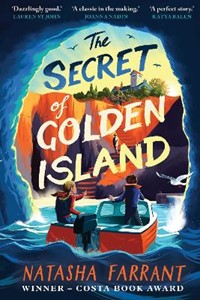Natasha Farrant


About Author
Natasha Farrant tells ReadingZone about her new adventure, The Secret of Golden Island. Her earlier children's adventure stories include Voyage of the Sparrowhawk, which won the Costa Children's Book Award, The Rescue of Ravenwood and The Children of Castle Rock.
As well as writing, Natasha has worked in children's publishing for almost 20 years, running her own literary scouting agency for the past ten. She grew up in London where she still lives with her husband and their two teenage daughters.
www.natashafarrant.com ; @NatashaFarrant1
Interview
The Secret of Golden Island (Faber Children's Books)
August 2024
When two children set off on an adventure to win an island, they enter a dangerous game in which the stakes are far higher than they could ever have imagined. In The Secret of Golden Island, there will be clues to find, hidden tunnels to navigate and shadowy villains to unveil, all wrapped up in a hearty Enid Blyton-esque adventure! We find out more about this perfect summer read from author Natasha Farrant.
Read a chapter extract from The Secret of Golden Island.
Natasha Farrant introduces The Secret of Golden Island
"No magic or wizards, but brave, brilliant children fighting high stakes and jeopardy
to save the day and get what they want."
1. Can you tell us a little about the kinds of stories you write?
I write adventure stories for children aged 8-12, set in the real world. No magic or wizards, but brave, brilliant children fighting high stakes and jeopardy to save the day and get what they want.
2. Which writers inspired you as a reader as a child, and how they have helped shape the kind of writer you have become?
The writer who turned me into a reader as a child was Enid Blyton. She was the first writer who made me truly believe that it was possible for ordinary children to have big, brave, wonderful adventures. A lot of undoubtedly better writers came after her, but hers were the books I gobbled down first, and she made me understand how thrilling books could be.
Now that I am all grown-up, I love reading writers like Eva Ibbotson, Hilary McKay, Katya Balen, Jo Nadin, Ross Montgomery…
"There is only one house on that island, and I wondered who lived there…"
3. What happens in your new adventure, The Secret of Golden Island? What inspired this story about winning an island?
Two children, Yakov and Skylar, enter a competition together to win an island. Skylar believes that winning will help her very sick grandfather get better. Yakov, who has a fled a warzone, wants it as a safe place for his family. Little do they know what danger they are putting themselves in…
There were three sources of inspiration for this story: my dear father's own illness; the beginning of the war in Ukraine; and a tiny, remote Breton island called Keller which lies just off the coast of the slightly bigger Ouessant, which I saw from afar when I was on holiday. There is only one house on that island, and I wondered who lived there…
4. You describe your new book as a 'love letter to tiny islands'. Nature and settings often play a big part in your stories - like the island Keller? What would you do if you won an island?
A funny story about Keller, the island. A couple of weeks after seeing it, I was at my mum's 60th birthday party in south-west France, where I happened to mention it to an old friend, who had decided at the last minute to drive from Florence overnight to attend. And what do you know - tiny Keller belongs to his ex-girlfriend's family, and he had stayed there many times!
It's actually only habitable in July and August, and it's more like camping than being in a house, but they absolutely love it. There's also talk, I believe, of turning it into a nature reserve… This is exactly what I would do, if I had my own island - though I would like it to be a little more accessible!
5. The children in this story both face difficulties in their home lives; Skylar with her ailing grandfather and Yakov who has escaped from a wartorn country. Why did you choose these backgrounds for Yakov and Skylar?
This story, more than any other I have written, was a response to what was happening around me. Dad was very ill, and as well as my own sadness I could see the impact it was having on his grand-children, including my daughters. And as I was starting to think about the book, the war in Ukraine had just begun. Dad, who was born in the middle of World War II, couldn't believe that once again refugees were fleeing war in Europe.
And then - when I was reading John Donne's poem No Man Is An Island, at Dad's, as the war was starting, in the place where I heard about Keller, it all came together with the idea of the island. I made two decisions as I was writing: the first was that although Skylar's Grandpa, unlike my Dad, would not die, I would be truthful about the long-term impact of illness. The second, that although Yakov's name and situation clearly suggest his country of origin, that I would not mention his country.
Millions of children are displaced by war each year. I didn't want my book to be a comment on any specific conflict: more an exploration of what it might feel like to be separated from home against your will, and to have to begin again.
"Of course it's important for children to hear about others' lives in what they read. It's important for all of us
to do that, adults also. How else can we develop empathy?"
6. Is it important that children hear and read about the lives of other children like Yakov and Skylar?
Of course it's important for children to hear about others' lives in what they read. It's important for all of us to do that, adults also. How else can we develop empathy? Here we have Yakov, who has had to leave his country because of a war. He's lucky of course, compared to others: he holds a British passport and he is staying with relatives.
But it doesn't mean he feels lucky: he has seen terrible things, he's homesick, he's lonely, his English isn't as good as he thought it was. I think there's a tendency to believe that displaced people should be grateful for the help they receive. Yakov is grateful, but he's also lost and angry and resentful. So there's food for thought here about empathy and trauma, and understanding that the way people present is not necessarily how they feel.
Then there's Skylar, whose beloved grandfather has had a stroke: I'm not sure we talk enough with children about the fact that loved ones get older and frailer. Relationships change - before the book starts, Grandpa is the one who takes Skylar out in his boat. By the end, she is doing the same for him. Obviously, not every child is able to sail their ailing grandparent to a private island! But children have a role to play in the lives of the elderly, and vice versa. I hope that reading Skylar's story can encourage children to explore their own relationships with the elders in their world.
7. There are also some grown-ups behaving very badly in this story. Do you enjoy writing villains?
I do love writing villains! They're an incredibly important part of a story - heroes can only ever be as strong as whoever they are opposing. It's no good being up against someone who's actually quite nice - there has to be a real fight there, otherwise where's the danger?
That said, I do enjoy surprising my readers with my villain's identity! And it's very important, when writing villains, to make sure they're believable: they have to have a real motive for whatever villainous thing they're doing, or the story falls apart.
"What it means to be far from home, and the courage it takes to start again."
8. Other than a great adventure, what would you like your readers to take from The Secret of Golden Island?
The importance of friendship. Faith that however bad things might be, there is always hope. What it means to be far from home, and the courage it takes to start again.
9. Which of your other books do you feel The Secret of Golden Island is closest to, and why?
Voyage of the Sparrowhawk, an adventure set on a barge in the aftermath of World War II. It also involves children going off on a boat, a strong friendship between a girl and a boy, and most importantly the whole theme of starting again.
10. Your children's books are packed with adventure - what has been your biggest real life adventure to date?
Ha! If I'm being honest: parenthood. If you want a more fun answer, living in Venezuela for six months when I was a student! During the week, I taught English and studied at the university. At the weekends, I would squeeze into a car with other students and we explored the whole country, often driving through the night, sleeping in hammocks on beaches, in friends' courtyards, in strangers' gardens, once inside a church… I loved it.
Discover The Rescue of Ravenwood, also by Natasha Farrant
Natasha Farrant's classic adventure The Rescue of Ravenwood, set in the idyllic landscape of the West Country, is a call to arms to fight for our precious spaces. The story reminds us of the treasured green places on our planet, and what we must be prepared to do to save them. Through the children's adventures at Ravenwood, the novel also explores made families and the importance of friendship. Watch Natasha Farrant introduce her book:
 The Secret of Golden Island
The Secret of Golden Island
 The Rescue of Ravenwood
The Rescue of Ravenwood
 Voyage of the Sparrowhawk: Winner of the Costa Children's Book Award 2020
Voyage of the Sparrowhawk: Winner of the Costa Children's Book Award 2020
 The Children of Castle Rock
The Children of Castle Rock
 Lydia: The Wild Girl of Pride & Prejudice
Lydia: The Wild Girl of Pride & Prejudice
